|
|  |
“Gorleben suitable, but seeking other sites” says minister
Diet Simon - 24.12.2006 04:12
The German environment minister says the salt deposit in Gorleben is geologically suitable for a final nuclear waste depository but other locations will be considered. “The findings so far about a dense rock cover and hence the barrier function of the salt were positively confirmed,” wrote the minister, Sigmar Gabriel, in response to an open letter from opponents of nuclear installations in the north German village.

Inside the exploratory salt mine opponents charge will be Germany's nuclear dump
“Thus the geological findings made so far do not rule out the suitability of the Gorleben salt dome,” Gabriel writes.
This diametrically contradicts expertises that the salt dome and the exploratory mine dug into it are in touch with ground water, risking widespread radioactive contamination of water supplies, and that an insufficient rock cover would let radiation escape into the atmosphere.
In an open letter a month ago the Gorleben resistance group, Bürgerinitiative Umweltschutz Lüchow Dannenberg, called on the minister to visit the area and explain his plans to the worried people there, who have fought nuclear dumping for 30 years.
They allege that every new consignment of highly active nuclear waste into a hall cheek-by-jowl with the exploratory mine makes permanent dumping in Gorleben more likely. So does the difficulty of shifting the waste yet again to any other location, given that every transport costs about 50 million euros to police.
Last month 12 so-called Castor caskets brought to Gorleben raised to 80 the number in a concrete hall protesters deride as no safer than a farm barn. Almost 140 are to be there ultimately. Anti-nuclear activists claim that every Castor casket contains significantly more radioactivity than an Hiroshima bomb.
Gabriel is a Social Democrat. His party are junior partners to Christian Democrat conservatives led by Chancellor Angela Merkel. Backed by the nuclear power industry, which has invested billions in Gorleben, Merkel favours nuclear power in general and Gorleben as final dump in particular.
The Social Democrats, previously in coalition with Greens, agreed with the power industry to phase nuclear generation out in about 30 years.
Gabriel refers to those differences in his letter. “In its agreement of 11 November 2005 the coalition set itself the aim to find a solution to the final repository problem during this legislative period,” he writes.
“Because the different positions between the coalition partners on the use of nuclear energy could not be resolved,” he goes on, “it has been affirmed that the agreement of 14 June 2000 reached between the federal government and the electricity companies, the procedures contained therein and the regulations provided by the revision of atomic law shall remain valid.
“In addenda 4 of the agreement referred to the federation stated on the exploration of the salt dome in Gorleben: ‘The findings so far about a dense rock cover and hence the barrier function of the salt were positively confirmed. Thus the geological findings made so far do not rule out the suitability of the Gorleben salt dome.
“‘However, in connection with the ongoing international discussion the federal government sees a need to develop the suitability criteria for a final repository further and to rework the concept for the final storage of radioactive wastes.’”
The minister writes that this [European] summer he tabled a concept for locating a final dumpsite in Germany and that this is “currently being deliberated within the government and between the leaders of the coalition parties”.
One of many criticisms by the Gorleben resistance is that this is just smoke and mirrors and that the issue is stuck between the parties. They fear that Gorleben as a final dump is a done deal.
“In my view,” Gabriel writes, “the Gorleben salt deposit must be included in a nationwide, open-ended location choice procedure and face competition with other, possibly better suited locations. Advantages and disadvantages of Gorleben will then emerge in the procedure.
“It is not justifiable in my view to predetermine Gorleben as the location without comparing locations. It would not be just, either, to following generations. These must be able to rely on a comparison having been made between various locations within the framework of an objective selection procedure to identify the best location.”
Responding to criticism of Castor transports to the storage hall in Gorleben, the minister writes that because of the June 2000 agreement between the power companies and the previous coalition government, the companies had built interim storages for spent fuel on or near their power station sites, which had prevented a large number of Castor transports to Gorleben.
“The return to Gorleben [from France] of the highly radioactive waste fused in glass conforms to international obligations entered by the federal government vis a vis France and Great Britain, to which my predecessor in the position of environment minister [Jürgen Trittin of The Greens] also felt committed.”
Nuclear opponents dispute an international commitment, saying the agreement was made between companies, is not binding in international law and can be renegotiated by politicians if they want to.
Environment ministry:
Bundesministerium für Umwelt, Naturschutz und Reaktorsicherheit, 11055 Berlin
Resistance group:
Bürgerinitiative Umweltschutz Lüchow-Dannenberg e. V. , Drawehner Straße 3,
29439 Lüchow
Sigmar Gabriel, Bundesminister, Mitglied des Deutschen Bundestages,
Alexanderstraße 3, 10178 Berlin. Postal: 11055 Berlin
TEL +49 - (0) 3018 - 305 - 2000
FAX +49 - (0) 3018 - 305 - 2046
 sigmar.gabriel@bmu.bund.de www.bmu.de sigmar.gabriel@bmu.bund.de www.bmu.de
|
| Read more about: natuur, dier en mens | | supplements | |


